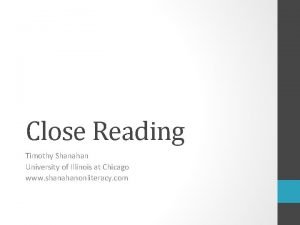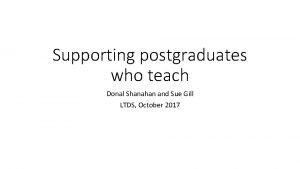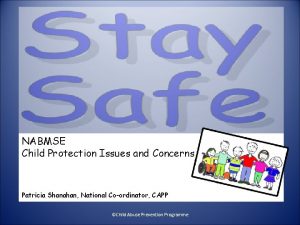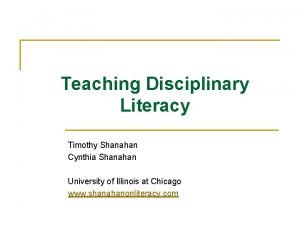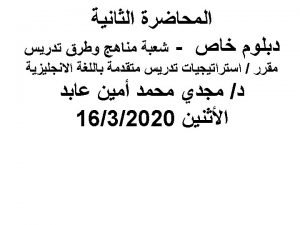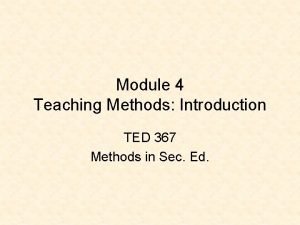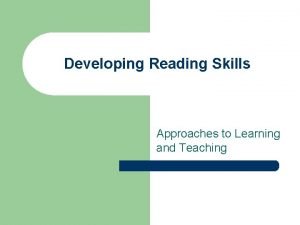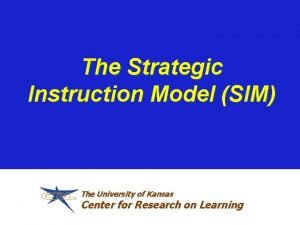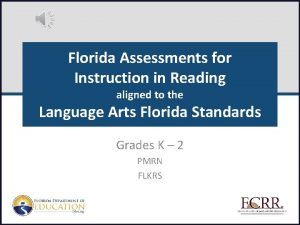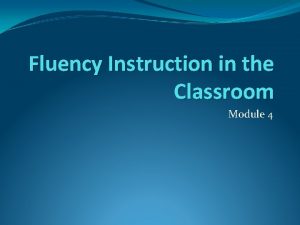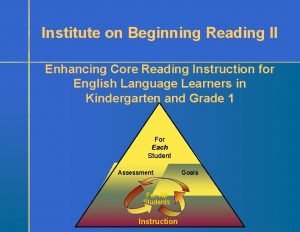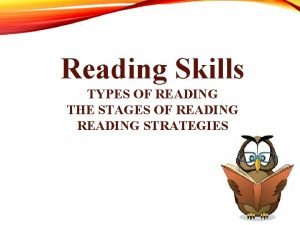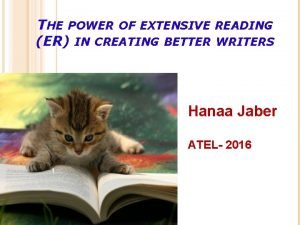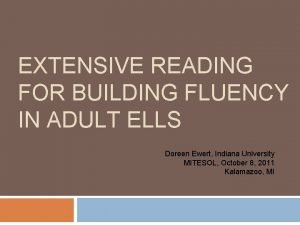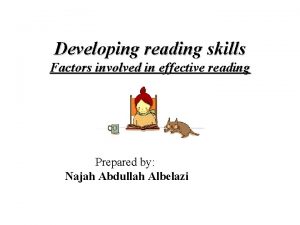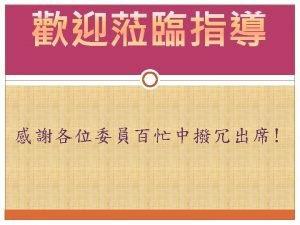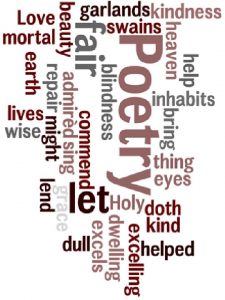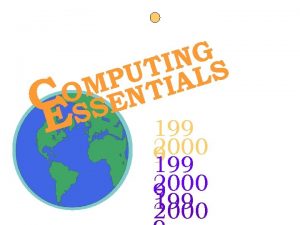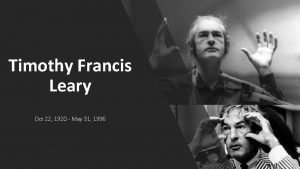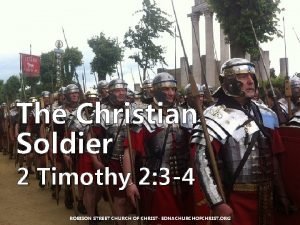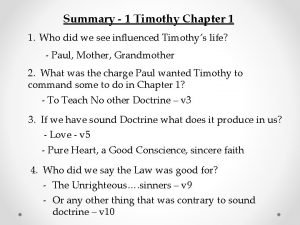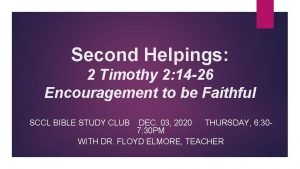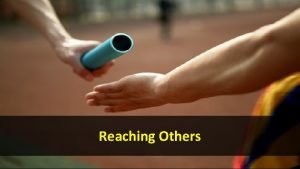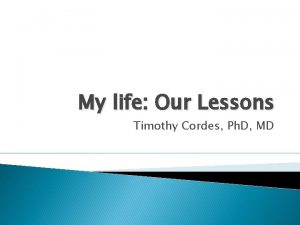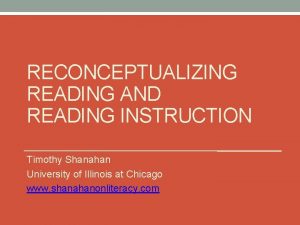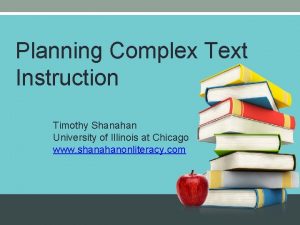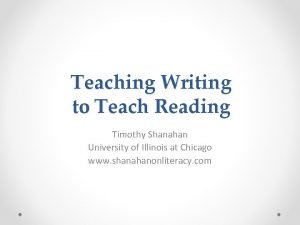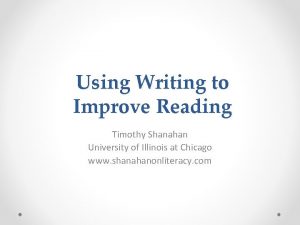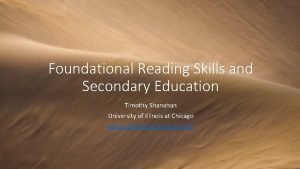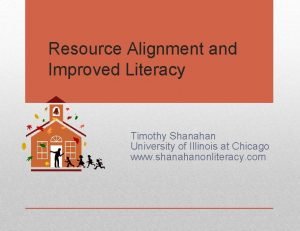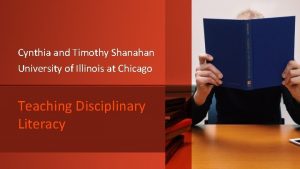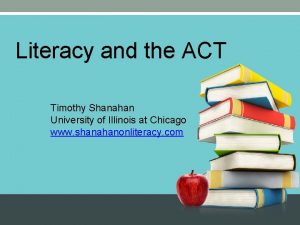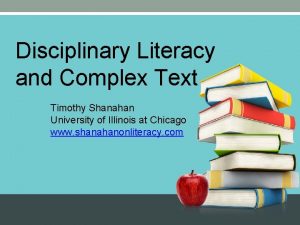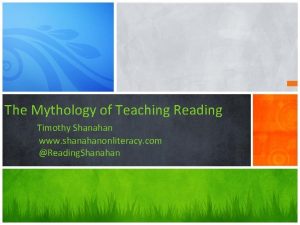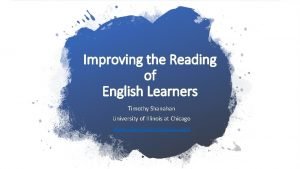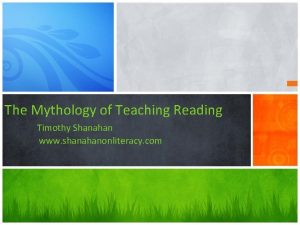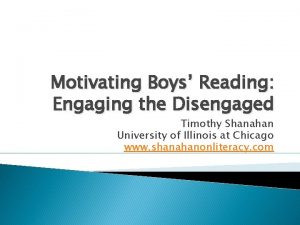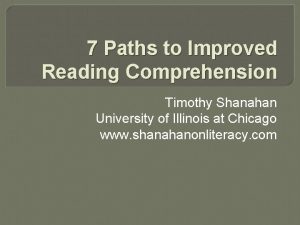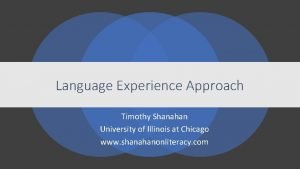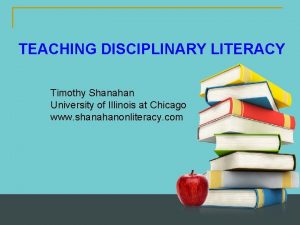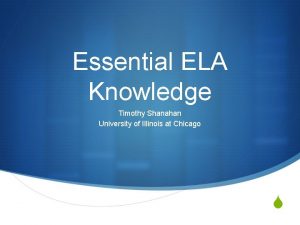Reconceptualizing Reading and Reading Instruction Timothy Shanahan University




























- Slides: 28

Reconceptualizing Reading and Reading Instruction Timothy Shanahan University of Illinois at Chicago www. shanahanonliteracy. com

Standardized Testing Has Shaped Our Conceptions of Reading • Even educators who hate standardized testing have come to view reading through the testing prism • Currently, our states adopt standards that are basically lists of reading skills • Those skills then are built into accountability tests through questions that mirror the skills lists • And, then textbook publishers and teachers construct lessons aimed at teaching those skills • The idea being that if kids get enough practice with these skills then they will become better readers

Examples of Reading Skills--WA Refer to details and examples in a text when explaining what the text says explicitly and when drawing inferences from the text. Determine a theme of a story, drama, or poem from details in the text; summarize the text. Describe in depth a character, setting, or event in a story or drama, drawing on specific details in the text (e. g. , a character's thoughts, words, or actions). Determine the meaning of words and phrases as they are used in a text, including those that allude to significant characters found in mythology (e. g. , Herculean). Compare and contrast the point of view from which different stories are narrated, including the difference between first- and third-person narrations.

Examples of Reading Skills--WA (cont. ) Refer to details and examples in a text when explaining what the text says explicitly and when drawing inferences from the text. Determine a theme of a story, drama, or poem from details in the text; summarize the text. Describe in depth a character, setting, or event in a story or drama, drawing on specific details in the text (e. g. , a character's thoughts, words, or actions). Determine the meaning of words and phrases as they are used in a text, including those that allude to significant characters found in mythology (e. g. , Herculean). Compare and contrast the point of view from which different stories are narrated, including the difference between first- and third-person narrations.

Example of Test Item--SBAC Refer to details and examples in a text when explaining what the text says explicitly and when drawing inferences from the text. Matthew and his family go to the farmer's market regularly. Pick the two details from the passage that best support this inference. �� Kayla helps load the crates onto the truck. ��. Matthew knows his friend Jose will be there. ��. Grandmother bakes pies to sell at the market. ��. Dad knows the name of the parking attendant. ��. Matthew thinks the rain will allow them to stay home

So the Tests Measure the Standards? • Not exactly • The standards specify the skills the children are to learn • The test items are designed based on those standards • But the test does not reveal how well students learn any of the specific standards

What the Tests Do – Content Claims “Common Core Aligned The Smarter Balanced assessment system covers the full range of college- and career-ready knowledge and skills in the Common Core State Standards. To do this, each test item is based on overall content claims and assessment targets. Content claims are summary statements about the knowledge and skills students are expected to demonstrate on the assessment related to a particular aspect of the standards. Within each claim area, assessment targets were developed to ensure that Item writers and reviewers address the standards, learning progressions, and the Depth of Knowledge levels. ”

SBAC ELA Content Claim • “Students can read closely and analytically to comprehend a range of increasingly complex literary and informational texts. ” • The test results tell us how students did with regard to this content claim, not on any of the standards themselves

Why don’t the tests offer an evaluation of student performance on the skills? • Because they cannot • Reading is not a collection of such skills and reading comprehension tests cannot measure them in any meaningful or useful way

Where did these questionable skills come from? • In 1917, Thorndike found that readers comprehended better when they answered questions about a text • Basal readers started publishing lesson plans during the 1920 s • If answering questions improved comprehension, it must be guiding readers to think about the text in a useful way • And, perhaps, different kinds of questions would get students to think about texts in particular ways • The tests followed suit—testing the kinds of skills the programs were teaching

But can tests measure these skills? • Research has cast doubt on the reality or the value of this skills orientation • These studies go back to the 1940 s and their pattern of results is pretty consistent • Here is just one example of these findings • However, what you need to remember is that this is an example and what I am showing you is true for all standardized comprehension tests

No performance differences due to question types (skills) •

No performance differences due to question types (cont. )

Text differences affect reading performance

The Usual Way of Doing this Study • In 1944, Frederick Davis noted that the reading tests of the day claimed to measure 8 skills (since they were asking 8 different kinds of questions) • He factor analyzed a popular standardized reading comprehension test of the time • The result: the test measured only a single factor

Reconceptualization of reading • Reading comprehension is not the ability to answer certain kinds of text questions • Reading is the ability to make sense of ideas expressed in text—the ability to negotiate the linguistic and conceptual barriers or affordances of a text

But isn’t reading a skilled activity? • Reading definitely requires some skills, but not reading comprehension skills, per se (or at least not skills that match up with answering particular types of questions) • Readers need to be able to perceive the language sounds within words (phonemic awareness) and that’s a skill • They must be able to decode print to pronunciation fluently and that’s a skill • And there are others, too (vocabulary meaning) • Skills require a certainty of outcome and a regularity in their execution (something like main idea is not a skill)

The role of questions • Answering questions is useful because it encourages readers to think about the text content (so do discussion, writing, and using the information in projects) • Particular kinds of questions can guide reader attention (e. g. , focus on numerals or dates, signal words) • However, that only works if readers are able to identify that information easily within text • Of all the reading strategies tested, schemes aimed at answering certain kinds of questions (e. g. , Bloom’s taxonomy, QAR) have the least impact on comprehension

The role of knowledge in comprehension • Another reason to reject the skills approach and to reconceptualize reading instruction is because of the important role that prior knowledge plays in reading comprehension • Studies show that readers do not just comprehend text by analyzing the texts themselves but that comprehension requires knowledge • We use knowledge to draw inferences, to disambiguate text, to reduce demands on working memory, etc.


"The procedure is actually quite simple. First you arrange items into different groups. Of course one pile may be sufficient depending on how much there is do. If you need to go somewhere else due to a lack of facilities, then this is the next step; otherwise, you are pretty well set. It is important not to overdo things. That is, it is better to do too few things at once than too many. In the short run, this may not seem important but complications can easily arise. A mistake can be expensive as well. At first, the whole procedure will seem complicated. Soon, however, it will become just another facet of life. It is difficult to foresee any end to the necessity for this task in the future, but then, one can never tell. After the procedure is completed, one arranges the materials into different piles again. Eventually they will be used one more and the whole cycle will then have to be repeated. However, that is part of life. "

Washing Clothes "The procedure is actually quite simple. First you arrange items into different groups. Of course one pile may be sufficient depending on how much there is do. If you need to go somewhere else due to a lack of facilities, then this is the next step; otherwise, you are pretty well set. It is important not to overdo things. That is, it is better to do too few things at once than too many. In the short run, this may not seem important but complications can easily arise. A mistake can be expensive as well. At first, the whole procedure will seem complicated. Soon, however, it will become just another facet of life. It is difficult to foresee any end to the necessity for this task in the future, but then, one can never tell. After the procedure is completed, one arranges the materials into different piles again. Eventually they will be used one more and the whole cycle will then have to be repeated. However, that is part of life. "

Building Knowledge • Knowledge is crucial to reading, but we don’t do a sufficient amount to increase student knowledge • Building knowledge through reading is more important than emphasizing certain kinds of questions • Need less emphasis on answering certain kinds of questions and more emphasis on remembering the information from text • One example: instead of practicing answering particular kinds of questions on the weekly or unit tests—review the content of the texts

Building Knowledge (cont. ) • Need to protect science, social studies, and the arts in the curriculum • Need to be more knowledge-oriented throughout the curriculum including in the reading texts that we use • Classroom libraries and read-alouds should skew more towards content, too

Another reason to rethink reading… • Reading ability is not as generalizable as once believed • We read differently across the disciplines • Each discipline (e. g. , mathematics, science, history, literature) creates and uses specialized texts and reads in unique or specialized ways • They do this because reading is shaped by the ways they create, disseminate, and evaluate knowledge • The ways literacy is used in the various fields of study is linked, inextricably, to the methods the fields use to create knowledge and the nature of the knowledge that it creates

Disciplinary Literacy • No one is surprised that the vocabulary of the different disciplines differs • But are you aware that the grammar differs markedly, too? • So does text structure • And the ways graphic elements are used • They also differ in terms of what tools readers can use to make sense of text and in the kinds of information that are considered to be important • It is not enough to teach general literacy abilities • Students need to learn how to read these more specialized texts

Summary We need to reconceptualize reading instruction… • It is the reading passages that matter, not the question types • Practicing reading skills should be subservient to developing rich knowledge • Students should be learning not just general literacy ability, but the ability to read appropriately within the disciplines

Today • This morning I will get to speak with the elementary teachers and my focus will be on teaching students to read complex texts and we’ll deal with the idea of the instructional level • This afternoon I’ll speak with the secondary teachers and my emphasis will be on disciplinary literacy and what that should mean to instruction in those grade levels
 Timothy shanahan close reading
Timothy shanahan close reading Smithe and shanahan furniture
Smithe and shanahan furniture Donal shanahan
Donal shanahan Patricia shanahan
Patricia shanahan Cynthia shanahan
Cynthia shanahan Differentiated instruction vs individualized instruction
Differentiated instruction vs individualized instruction Difference between direct and indirect instruction
Difference between direct and indirect instruction While reading activities
While reading activities Sim writing strategies
Sim writing strategies Florida assessments for instruction in reading
Florida assessments for instruction in reading Fluency oriented reading instruction
Fluency oriented reading instruction Enhanced core reading instruction
Enhanced core reading instruction Reading aims
Reading aims What is reading and types of reading
What is reading and types of reading Intensive reading and extensive reading
Intensive reading and extensive reading Extensive reading
Extensive reading Ineffictive
Ineffictive 沈榮麟
沈榮麟 Eyes as wide as a football pool
Eyes as wide as a football pool Timothy winters worksheets
Timothy winters worksheets Timothy francis leary
Timothy francis leary 2 timothy 2:3-4
2 timothy 2:3-4 Summary of 1 timothy chapter 1
Summary of 1 timothy chapter 1 2 timothy 2:14-26
2 timothy 2:14-26 2 timothy 2:1-7 esv
2 timothy 2:1-7 esv Qualities of a good soldier
Qualities of a good soldier 1 timothy 5:8 nkjv
1 timothy 5:8 nkjv Timothy townsend uf
Timothy townsend uf Timothy cordes
Timothy cordes
